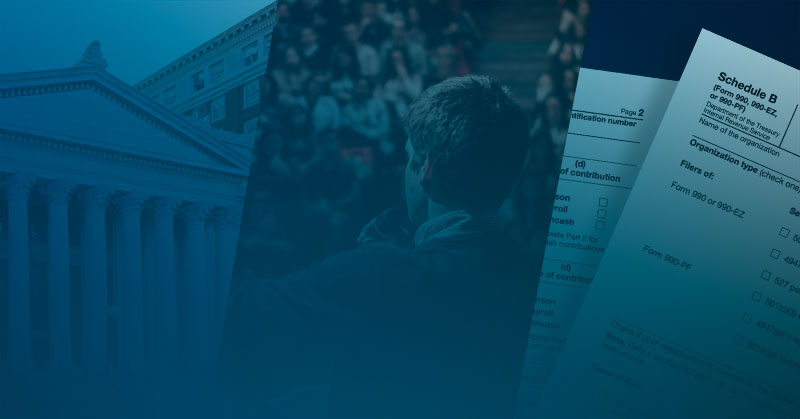-
Software
Compliance Software
Oversee licenses, track renewals, access documents, and more from a single interface.
Software Overview -
Services
Compliance Services
Full service compliance solutions for organizations throughout their entire lifecycles.
Services Overview -
Industries
-
Partner
- Information Center
Nonprofit Sector Update: NYS Suspends Schedule B Requirement and More

The July 1, 2021 decision by the Supreme Court of the United States (SCOTUS) in Americans for Prosperity Foundation v. Bonta has started a ripple effect in the world of charitable solicitation regulation.
Nonprofits should expect charitable solicitation registration requirements to change frequently. Organizations that handle their registrations in house need a way to stay informed. This edition covers updates in Connecticut and New York. For continued updates, please subscribe to our email list.
New York Attorney General’s Charities Bureau Suspends Collection of Form 990 Schedule B
Effective July 30, 2021, New York State (NYS) has elected to suspend its requirement to collect Form 990 Schedule B from registering nonprofit organizations. According to the NYS website,
“The New York Attorney General’s Charities Bureau has suspended its collection of IRS Form 990 Schedule B while we review any amendments that may be necessary to our policies, procedures and forms in order to comply with the U.S. Supreme Court’s decision in Americans for Prosperity Foundation v. Bonta (594 U.S. __, 2021). Effective immediately, charities’ annual filings will no longer require disclosure information that identifies donors. Any notices that charities have received regarding any deficiency due to missing or incomplete Schedule Bs are no longer operative as to such deficiency, and annual filings will no longer be considered deficient in such regard.”
For registering organizations, Schedule B is no longer required with annual CHAR500 reporting materials. Additionally, outstanding deficiency letters specifically requesting copies of unredacted Schedule B are no longer operative.
Prior to the SCOTUS decision, New York and California joined New Jersey as the only three states to require unredacted Schedule B. At this time, New Jersey has not changed its requirement to collect Schedule B with its CRI-150I and CRI-300R filings.
As NYS contemplates amendments to its policies, procedures, and forms, Harbor Compliance will provide updates as relates to our clients.
Federal Court Rules Connecticut Fundraiser Requirement Violates Free Speech
On July 21, 2021, the United States District Court, District of Connecticut ruled in favor of a challenge to Connecticut’s Solicitation of Charitable Funds Act (SCFA). In the lawsuit, Adam Kissel, a professional fundraiser, argued that the SCFA “violate[d] his First Amendment right to engage in speech involving charitable fundraising.” Kissel challenged four requirements of the SCFA, specifically:
- That he submit to the Connecticut Department of Consumer Protection (“DCP”) a notice 20 days in advance of his intent to engage in solicitation activity.
- That he submit the text of his intended solicitations to the DCP.
- That he tell prospective donors what percentage of their donation will be given to the charitable organization.
- That he keep records of donors and donations for the DCP to inspect.
The decision, made by federal judge Jeffery A. Meyer, was made in favor of Kissel. As a result, the state was enjoined from enforcing the requirements against Kissel.
You can read the full text of the order here.
Connecticut’s requirements broadly remain in effect. It remains to be seen whether subsequent appeals or challenges will impact the state’s ability to enforce the requirements. Harbor Compliance is monitoring the progress of this and similar cases. We will continue to provide relevant updates as we learn them.
Harbor Compliance tracks legislative changes and maintains regular contact with state agencies. We help client organizations with their state registrations as well as navigate a landscape of complex and ever-changing requirements. For more information on our fundraising compliance solutions, click the following link:

© 2021 Harbor Compliance. All rights reserved.
Harbor Compliance does not provide tax, financial, or legal advice. Use of our services does not create an attorney-client relationship. Harbor Compliance is not acting as your attorney and does not review information you provide to us for legal accuracy or sufficiency.






